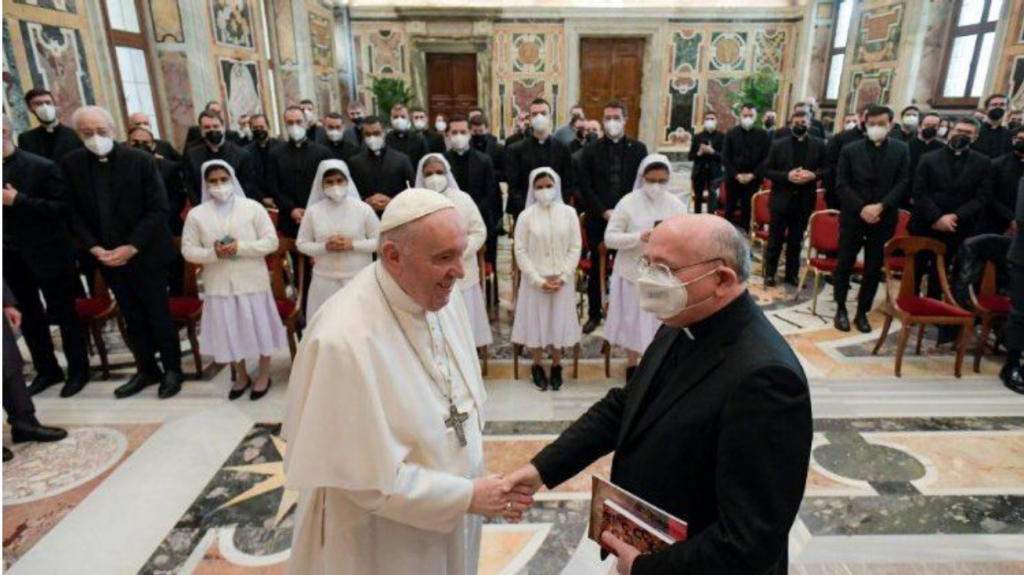
THE POPE CALLS ON PRIESTS TO DREAM OF THE CHURCH OF TOMORROW
In what state of mind and with what aspiration should we commit ourselves to the priestly ministry? On Monday, February 7, the Pope suggested to the students of the Lombard Pontifical Seminary of St. Ambrose and St. Charles in Urbe, located in the heart of Rome, that they not lock themselves up in their sacristies or in "sterile dialectics," but rather take the Gospel to the world "that thirsts for Christ," as did an alumnus of their seminary, Pope Pius XI.
In memory of the 100th anniversary of the election of Pius XI this year, the Pope received the Lombard Seminary, where Achille Ratti was a student, at noon on Monday. Francis was inspired by the work of his predecessor to offer the priests who study there perspectives for their ministry, in the service of the Church and the Italian people.
Pius XI's first prophetic sign was that he chose not to introduce himself to the faithful inside the Vatican Basilica, but from the famous loggia overlooking St. Peter's Square. It would have taken forty minutes to open the balcony doors, the Pope said. They had been closed for years because the place had become a warehouse. Pius XI waited.
This gesture "is worth a thousand words," according to Francis. First of all, he reminds priests that they must be open, "widening the horizon of their pastoral work to the dimensions of the world, reaching out to every child whom God wants to embrace with his love. Francis implores them not to remain "barricaded in the sacristy," not to "cultivate small closed groups where we can cuddle and be quiet. A world is waiting for the Gospel.
Living in the concrete situations of the world
The Lord wants his shepherds to be conformed to him," continues Francis. He invites them to "carry in their hearts and on their shoulders the expectations and burdens of the flock. In order for the ministry to become a blessing from God for the world, priests must have "an open, compassionate and merciful heart" but also "hard-working and generous hands, which get dirty and hurt for love, like those of Jesus on the cross".
Studying is a "gift of God", but, Francis emphasizes, knowledge must never be abstracted from life and history. "The Gospel is not served by a Church that has many things to say, but whose words lack unction and do not touch the flesh of the people. To have words of life, it is necessary to bend science to the Spirit in prayer and then to live in the concrete situations of the Church and the world. He pleads for priests "burned by the desire to bring the Gospel to the streets of the world," especially in the poorest and most forgotten places.
Warning against careerism
Another prophetic clue from Pope Ratti: in his first homily delivered on June 4, 1922, for the 300th anniversary of the founding of the Congregation of Propaganda Fide, Pius XI invites everyone to ask themselves what they have to offer the Lord. "A good question," notes Francis, who warns priests studying in Rome against careerism. This question "does not revolve around you, your desire for this cathedra, this parish, this position in the curia; no, it is a question that asks you to open your heart to availability and service."
The Pope regrets that often, especially in Italy, the ecclesial discourse is reduced to a "sterile internal dialectic between those who innovate and those who are conservative, between those who prefer one politician and those who prefer another", then, says Francis, they forget the central point: "to be Church to live and spread the Gospel". The Pope asks them not to be preoccupied with their own little preoccupation because "there is a whole world that thirsts for Christ". He calls them to cultivate from the Eternal City "an open, willing, missionary heart.
The voice of the voiceless
Finally, Pope Francis evokes the modernity of the speech of Pius XI who, in his social encyclical "Quadragesimo anno", denounced the despotic power of those who concentrate in their hands all the wealth, "the soul of the economy". In a context still marked by inequalities, and even more so by the pandemic, Pope Francis asks them to be "weavers of communion, eradicators of inequalities, pastors attentive to the signs of suffering of the people". He hopes that the knowledge they have acquired will enable them to be "competent and courageous in raising up prophetic words on behalf of the voiceless."
To accomplish the "great tasks" that await them, the Pope invites them to ask God to dream of the beauty of the Church: to dream of the Italian Church of tomorrow, more faithful to the spirit of the Gospel, more free, fraternal and joyful in the witness of Jesus. "A Church that cultivates a communion stronger than any distinction and that is even more passionate about the poor" concludes the Pope.
